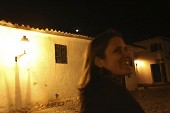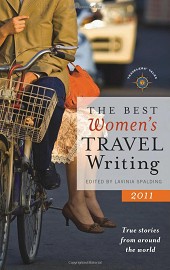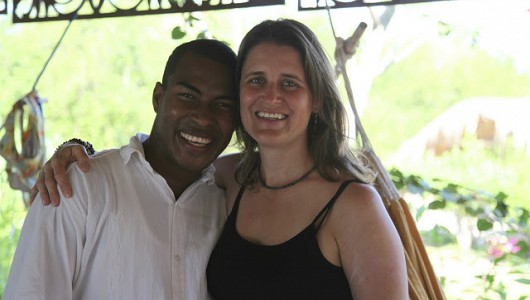Katherine Jamieson is a graduate of the Iowa Nonfiction Writing Program, and her writing has been published in The New York Times, Washingtonian, Ms., Narrative Magazine, and Brevity. In addition to her essay in BWTW 2011, she had two pieces anthologized in The Best Travel Writing 2011. In order to maximize traveling options, she now teaches literature and writing online at colleges around the US. Visit her at www.katherinejamieson.com
When did you first know you were a traveler?
In 1994 I took a trip to Eastern Europe while I was studying in Paris for a semester in college. The trend of young Americans traipsing through Prague and Budapest was nascent, and the references to Poland and Bulgaria in our Let’s Go Europe! scant. In fact, the only advice anyone had for us was to bring toilet paper and try not to get robbed. The Gypsies were rumored to have elaborate methods for fleecing tourists, including tossing their babies at unwitting travelers; presumably when you dove to rescue the falling infant, they grabbed your bags and cash. No one ever said what happened to the baby after that.
In any case, after a few days of travel with stale baguettes and Camembert, my friend Julie and I landed in Krakow’s train station at about midnight. Menacing men smoked and glowered at us from every bench and corner. It was dank, grim, un-gilded, and all-around Communist. I loved it. We spent two weeks traversing the region by train, and our adventures were epic, if only to us: being arrested by an off-duty, drunk Czech cop, doing shots of viscous, burning Becherovka in underground clubs, wandering for hours through an overgrown concentration camp. I’d grown up hearing the mangled aphorism “nothing ventured, nothing lost,” and it had come to permeate my way of thinking more than I realized. Eastern Europe broke this open for me; it became the inspiration for my wanderlust for many years.
What’s one place that has moved you or changed you in a significant way?
I think Guyana’s impact on me was so strong because it felt like the first time I had been forced to slow down in my life.
In any case, it’s a rigorous place, a tropical country of incredible heat, pounding rains, immense undergrowth. Mosquitoes are constant; malaria, and a number of other tropical diseases, endemic. Poverty is widespread and grinding, and the need-for education, health care, clean water-is overwhelming. And yet, it is my touchstone landscape. The smells, tastes, and sounds are as available to me now, 15 years later, as those of my current home. I think Guyana’s impact on me was so strong because it felt like the first time I had been forced to slow down in my life. There was really nothing to “do” there in the traditional sense: no place to go, nothing to see. Guyana was about hard work and surviving the elements; there was no energy for ambition. And this allowed me the freedom to quiet down and observe the world around me, perhaps more than I ever had before. In time, it became imperative to write down these observations. I had imagined becoming a writer before I went there, but Guyana made me a writer.
Is there something you always do, whenever you’re on a trip?
Whenever I’m traveling, I seek out local supermarkets. I think it’s fascinating how common things are sold for different purposes around the world: bags of rice for dog food in Trinidad, cow’s face for making soup in Guyana, or tomatoes to be eaten like peaches in Czech Republic. You can also tell a lot about a country by reading through their greeting cards; they’re like this arcane little window into the humor and sentimentality of a culture.
I’ve worked in holistic health, so I’m always interested in what kinds of herbal or alternative products are being sold internationally that aren’t available in the US. My great find was an amazing homeopathic apothecary a few years ago in Bogota. Everyone was wearing white coats like pharmacists, and there were jars labeled with the names of all the homeopathic remedies in Spanish. When I asked one of the women working there about the shop she said, “of course, homeopathy has been in Colombia for many decades, and Brazil and Argentina, Mexico too.” Who knew?
Who is the most inspiring or interesting person you’ve met on the road?
I met a woman named Rosa Salamanca when I was traveling in Colombia a few years ago. An anthropologist by training, she works with women refugees who have come to Bogota seeking work, often after their husbands have been killed (Colombia has an enormous number of internal refugees from the ongoing violence in the country). Rosa knew everything about the problems in her country, down to the nitty-gritty statistics on rape, domestic violence, and murders of indigenous people. And yet, she was cheery, vibrant and had a great sense of humor. I was deeply impressed with her ability to see so much horror and injustice firsthand, and yet be such a delightful person. I think this kind of broad perspective matched with a generosity of spirit is rare, but much needed.
In your opinion, what is the greatest reward of traveling?
In a sense, I think it’s very simple and perhaps trite: seeing things differently. After spending long stretches at home, I tend to get stuck in my ways and start to believe that the world is a limited, predictable place. But then, I’ll see something unusual in my travels-a curtain made of bottlecaps, a meal garnished with flowers, the wild juncture of ocean and jungle-and it jolts me out of my habituated perspectives into an entirely new aesthetic. When I get home even my humdrum possessions look unique. A stapler? A hair dryer? As I’ve gotten older, I’ve come to see how rare-and challenging-it is to gain a new angle on life and this has made me appreciate the opportunity to travel even more.











